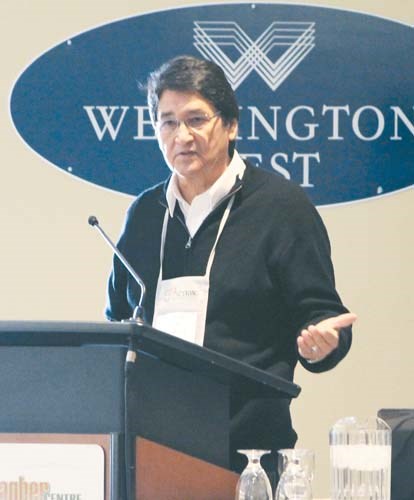No presentation at last week's TransACTIONS summit in Yorkton was more central to the event's message of cooperation than that of Chief Ovide Mercredi from the Manitoba Cree Nation of Misipawistik.
One of Canada's most accomplished First Nations leaders, Mercredi has been known as Federal Chief for the Assembly of First Nations, a key figure in the negotiation of the Charlottetown and Meech Lake Accords, a university chancellor, and a noted advocate for the rights of all people.
He has addressed the United Nations on multiple occasions and has been nominated for India's Gandhi Peace Prize.
In Yorkon on Thursday, he spoke on the changes needed to bring his people out of poverty for the benefit of all Canadian citizens.
Wealth, says Mercredi, is the key missing component preventing aboriginal people from leading better lives: not intelligence, or compassion, or ambition, but wealth.
However, attaining that wealth will require much work from both First Nations and non-First Nations people, says the Chief.
"The first thing that has to change is that [First Nations] people have to stop thinking that nothing can improve. People have to believe that change can be organized and can be reached through effort and through good planning and through cooperation.
"People on the reserve, they have to take charge of their lives. If they have any needs, like if they dropped out of school, they have to make the decision to go back to school. If a person doesn't have a job, they have to make the decision to get the training that will get them a job.
These are individual choices that our people have to make."
Meanwhile, it is the leadership of First Nations communities that has the responsibility of creating those jobs and educational opportunities.
"But it would be a mistake to think that you can deal with the poverty on reserves just by economic development on reserves," Mercredi continues.
"Our people have to branch out. They have to shake hands with the mayors and councils of their neighboring communities. They have to reach out to bigger centres like Yorkton or Regina. And they have to create partnerships with like-minded people to create jobs and economic opportunities back home."
But for any of this to happen, urges the Chief, Canada's non-First Nations population must meet its aboriginal people halfway.
"My message to my people is 'Get on with it. Get off your chair and start moving.' But what I'm saying to the non-aboriginal people is 'Help us do it. Break down the barriers of mistrust. Take the risk of trusting someone. Don't deal with us on the basis of stereotypes. Let's build a new relationship, become better neighbors, create a better economy for the region.'"
Mercredi says he has seen plenty of positive signs of progress: among them, his people's willingness to take the opportunities available to them.
"People shouldn't assume that people living in poverty don't want to change. The fact is they do want to change. They want a better life."
Governments, industries, and community colleges also are now making efforts to reach out to aboriginal people, the Chief adds.
"They're becoming part of the solution."
There is too much at stake to delay further, Mercredi insists. With First Nations populations growing and aboriginal people set to make up the future labor force of the West, it is in the interests of everyone to get them more actively involved in the economy.
"So the time for action is now, not 20 years from now. The time to create jobs and training for jobs is now."



